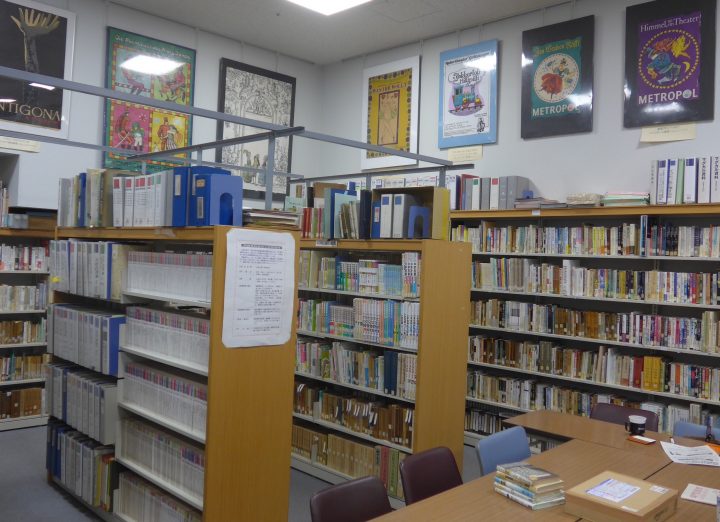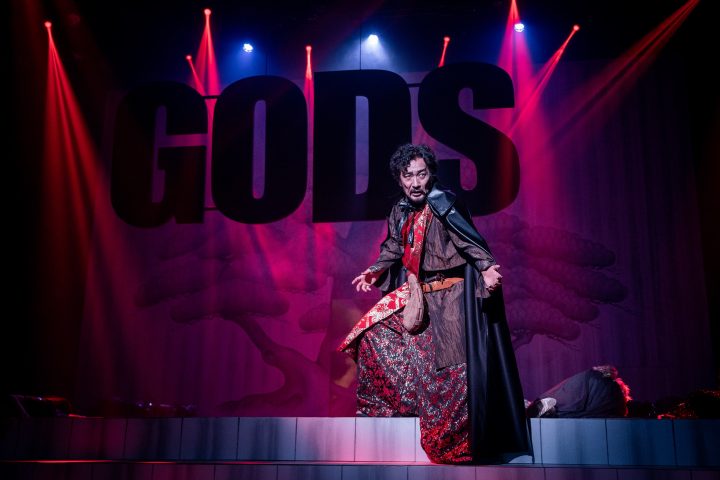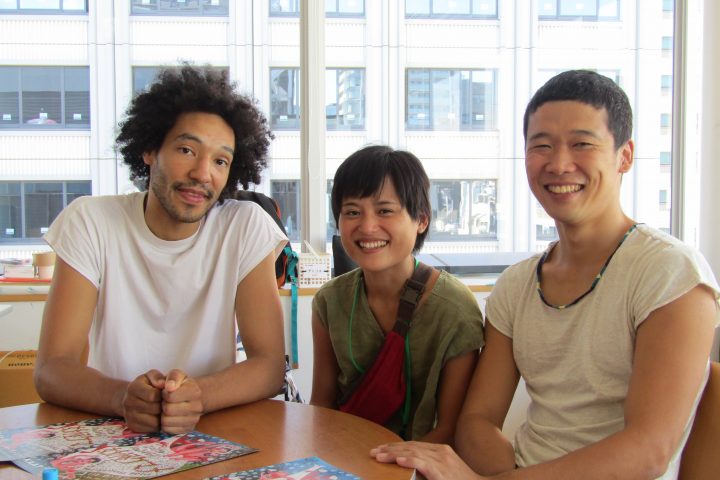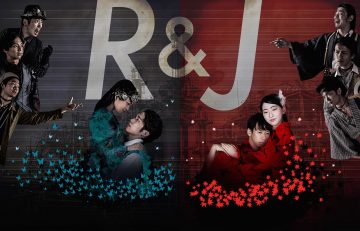Late Autumn KAAT Performance/Director Special Interview – Junnosuke Tada (Tokyo Deathrock) x Toshiki Okada (chelfitsch)
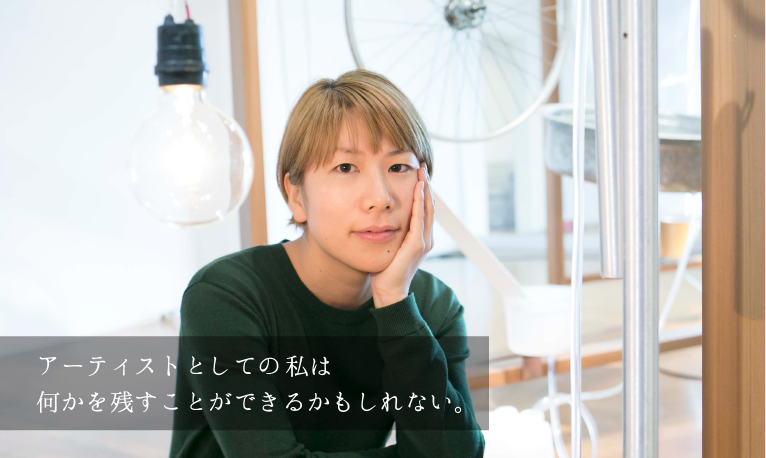
Interview/Text: Chikara Fujiwara Photo: Masamasa Nishino
From late fall to winter, two notable plays will be performed at KAAT (Kanagawa Arts Theater). Tokyo Deathlock + 12th Language Theater Studio “가모메 Kalmegi” and chelfitsch “Super Premium Soft W Vanilla Rich”. Both works premiered overseas, and this will be the first time they will be performed in Japan. Chikara Fujiwara, a theater critic who saw the world premieres in Seoul and Mannheim, respectively, was the audience for a conversation between the two directors.
The recording location is Kirari☆Fujimi Theater, where Junnosuke Tada serves as the artistic director. We had a conversation via Skype with Toshiki Okada, who is staying in Modena, Italy for a tour.
<Profile>
Junnosuke Tada
Born in Chiba in 1976. Director/director of Tokyo Deathlock.
He creates a wide range of works, from classical to contemporary plays and performance works. It is characterized by a production that focuses on the phenomena on the spot, including the actors' bodies, the audience, and time. Professing to "LOVE theater," in addition to the theater company's works, we are demonstrating the dialogic power of theater through the creation of citizen-participated works while staying in local communities, communication classes at elementary, junior high, and high schools, lectures at universities, and workshops. , widely conveying the power of collaboration to people who are not specialized in theater. He is active both domestically and internationally, including performances in Korea and France, and joint productions. As an actor, he has guested with other theater companies and appeared in movies and TV dramas. He also belongs to the Seinendan Production Department and co-chairs the Seinendan Link Nikki no Kai with Satsuki Miyamori. In April 2010, he became the artistic director of Fujimi Citizens' Cultural Center Kirari☆Fujimi, making him the youngest artistic director in the history of a public cultural facility's theater department. In December 2013, he became the first foreigner to receive the Dong-A Drama Award, the most prestigious award in Korea, for the Japan-Korea co-production ``Galmaegi''. 2009-2010 Saison Cultural Foundation Junior Fellow artist. Since 2013, she has been a dispatched artist to Regional Creation Regional Theater. Part-time lecturer at Shikoku Gakuin University.
▼ Tokyo Deathlock + 12th Language Theater Studio “가모메 Kalmaegi”
Thursday, November 27, 2014 - Sunday, November 30, 2014 @ KAAT Kanagawa Arts Theater
Toshiki Okada
Born in Yokohama in 1973. Playwright/novelist/head of chelfitsch.
His activities are considered to overturn the traditional concept of theater and have attracted attention both domestically and internationally. In 2005, he won the 49th Kishida Drama Award for ``Five Days in March''. In July of the same year, he participated in the final selection of "TOYOTA CHOREOGRAPHY AWARD 2005 - Discovering the next generation of choreographers" with "Cooler". In 2007, he published his debut novel collection, ``The End of the Special Time We were Allowed,'' from Shinchosha, and won the 2nd Kenzaburo Oe Award the following year. Since 2012, he has served as a judge for the Kishida Drama Award. In 2013, he published his first collection of theater essays, ``Going Back: Theater Theory for Transforming,'' from Kawade Shobo Shinsha.
▼Chelfitsch "Super Premium Soft W Vanilla Rich"
December 12th (Friday) - 21st (Sunday), 2014 @ KAAT Kanagawa Arts Theater
Connection with Korea
──I would like you to talk freely today, focusing on the works that will be performed at KAAT.
In the first place, there aren't that many opportunities for the two of you to talk in public, right?
Tada : When I made a piece called ``Rebirth'' some time ago, I had someone come to the after-sales talk.
──This year you are meeting in Seoul.
Okada : Yes, Mr. Tada came to see the performance of ``Chichi to Toko'' in Seoul.
──Mr. Tada has a close relationship with your work, having won three awards at the East Asia Drama Awards for ``Kalmegi'': Best Picture, Best Direction, and Best Scenic Design/Technology, and has performed the work many times in Korea.
Mr. Okada has also performed several times.
Okada : I've been there about 4 times. That's why some of our customers continue to watch us.
Tada : There are many Okada-san fans in Seoul. But will the next (next year's) work be the first to be made in Korea with Koreans?

Okada : It's my first time. So, when I auditioned three people that I thought would be good, two of them had worked with Tada-san in the past (lol).
Tada : One of them is an actor who also appears in "Karmegi."
Okada : I haven't seen "Kalmegi" yet, but I think that the award-winning result is the result of the continuous work that Tada-san has been doing with Korean actors since before that. . I would like to ask you about the process.
Tada : At first, in 2008, I participated alone in a festival where Korean actors and Asian directors were paired together to create a work. The actors who appeared at that time continue to appear. At that time, I met Song Ki-eun, who is also the author of the current film ``Galmaegi,'' and we continued working together with his theater company called 12th Language Theater Studio and Tokyo Deathlock. We obtained grants from each other's countries, opened theaters in Seoul, and when we could be involved in festivals...we did pretty normal, steady activities. I think the audience comes to see us thinking that we are a ``Japanese director,'' but our intention has been to work steadily in a small Korean theater.
The original idea for ``Kalmegi'' was Chekhov's ``The Seagull,'' and Song Ki-eun transplanted it to the era of Japanese colonial rule in the first half of the 20th century. Even with the cooperation of Song Ki-eun and his 12th Language Theater Studio, the Japanese director Junnosuke Tada is directing that story, which is quite a stressful job, isn't it?
Tada : It's true that Song Ki-eun's specialty was writing about the colonial era, but she has been working for the past five years basically saying, ``I don't talk about history.'' It was. As a Japanese person, when dealing with the history with Korea, I can't help but think about my own problem, ``What does it mean to be Japanese?'' For example, even if the same production is performed by a Korean director, it may be okay, but if it is a Japanese director, it may become a problem.
──In that regard, what was the reaction to last year's "Kalmegi" performance in Seoul?
Tada : Of course, there were pros and cons regarding history. Even within Korea, things are complicated. However, being able to deal with the history of Japan and Korea within Korea was a great response. I think it was good for the future of Japanese and Korean artists. But I think the situation is quite different between performing in Korea and in Japan, especially with ``Kalmegi''. The amount of information the audience has (about the history of both countries) is also different...

“가모메 Kalmaegi” 2013.10 DoosanArtCenter Space111/(C)DoosanArtCenter
<Chikara Fujiwara Show Review>
Tokyo Deathlock + 12th Language Theater Studio “가모메 Kalmaegi” Seoul performance @ October 2013
This work takes the setting of Chekhov's ``The Seagull'' and transplants it to the era of Japan's colonial rule of Korea in the first half of the 20th century, the so-called Japanese colonial era. In recent years, Tokyo Deathlock, led by Junnosuke Tada, has been developing plays such as ``Symposium'' and ``Ceremony,'' in which they create a scene together with the audience, but this ``Kalmaegi'' is completely different. drama play. The acting level of the actors was also very high, and they brought a thrilling story to life. It was a stage that gave me an unforgettable impression.
Since we are dealing with a history that can be said to be taboo in Japan-Korea/Korea-Japan relations, I could feel the tension (in a very good way) on the part of the Japanese actors in Seoul, but in the Japan performance, the situation was different. It's going to change a lot. At the end of last year, this work won three prizes at South Korea's Dong-A Drama Awards: Best Picture, Best Direction, and Best Scenic Design/Technology Award. This is the first time in history that a Japanese director has won this award.
Disparity in the amount of information between Japan and South Korea
Tada : When I saw chelfitsch's "Ground and Floor" in Seoul...I saw it in Yokohama before that, and it deals with language issues, and I was curious about the reaction when it was performed in Japan and overseas. It's definitely different, isn't it?
──You might say something like, ``I'm annoyed that the subtitles haven't caught up with me at all!'' or ``Some people hear words they don't understand and say it's like music.'' It was used intentionally to provoke the non-Japanese speaking audience.
Tada : Yes, it's also made for people who don't understand Japanese. So, I was wondering how much of it was made for people who understand Japanese.
Okada : What each person receives will be different. However, I put a lot of thought into making it something that both people could accept. There's no way I'll forget to show it to a Japanese audience. But, for example, if the premiere is to be held in Europe...or rather, in a place where there are basically no customers who understand Japanese, that's the same for this time's ``Super Premium Soft W Vanilla Rich.'' After all, the impact is not small. I can't get the audience of either one out of my mind, and I'll definitely say this: There's no priority there at all.

──The Mannheim performance of ``Super Premium Soft W Vanilla Rich'' ironically exposed the caricature of modern Japan, symbolized by the convenience store, to European audiences. But when it's performed in Japan, it doesn't really matter to the audience...
When I interviewed him this summer, he said that he wasn't that conscious of showing it to Japanese people yet, but he was currently on an overseas tour with "Super Premium" and was going to Yokohama after this. The snow is falling, isn't it? Are there any changes in your state of mind now that you are in the midst of this?
Okada : Of course there is. When you're on tour, your work grows and matures, and you're going through that process right now. I think it's a good feeling. Let's go to Yokohama like this! , something like that (laughs). So the modes are completely different. But as for what kind of reaction I'd get in Yokohama, I didn't really have any expectations, so I had no choice but to do it. So I want to do it soon. Was that a good answer?
──Do you also feel that your work gradually matures as you tour?
Tada : Once you tour, that's just the way it is. I think it should be done. I don't know if it's a good or bad thing that there was a gap of one year since the premiere of ``Galmaegi'' in Seoul, but at least the situation has changed since then. Japan-Korea relations, Japan as well... The way you look at it may change.
Okada : ...Um, excuse me, I'm a little curious, so can we change the topic? When talking about the differences between Japan and other countries, I think our works, such as ``Ground and Floor'' and ``Super Premium'', can be roughly described as ``differences between Japan and the rest of the world.'' But maybe that's not the case with ``Kalmegi,'' and it's about the ``differences between Japan and Korea.'' I think the difference between the cases is important.

Photo left: "Ground and Floor" © Misako Shimizu / Photo right: "Super Premium Soft W Vanilla Rich" © Christian Kleiner
--In other words, there is something special between Japan and Korea.
Okada : What Mr. Tada said earlier, and I think it's really true, is that ``the amount of information that the audience has in Korea and Japan is different.'' Compared to Koreans, Japanese people have no more knowledge about the history between Korea and Japan. I really feel the dissatisfaction that Korean people have with this gap. Don't you think so?
Tada : I think so.
Okada : For example, Japanese people don't really know what year 1910 is. Everyone, including Koreans, knows that that was the year Japan annexed Korea and colonized it. It is recognized on the same level as ``1945''. That difference is huge, isn't it? Do you control the amount of information around that? I'm just speculating, but I think there are things that we don't need to tell Korean audiences right now that Japanese people wouldn't understand.
Tada : I would like people to think about not knowing information. I don't think Japanese people can imagine what Koreans thought when they saw this work. But this work has already been performed in Korea, so if people are aware of that, I think it's worth performing in Japan. I think it might be harsh if you don't even know that they annexed Korea and ruled it as a colony.
Okada : I wonder how many people don't know?
Tada : I don't think children would know about it...even high school students. You're not used to seeing the Japanese ruling Korea. Koreans have been watching it in photos, on TV, and in movies since they were children... In that sense, I think Japanese people would be more shocked. There's a Korean actor in front of you, so you might feel uncomfortable. It might be a good idea to create a really cruel scene where a Japanese person bullies a Korean person, but basically there is no such thing.
distance yourself from your native language
Tada : Mr. Okada created it in America with American actors, right? Was that the first time you wrote something in a foreign language?
Okada : It's "ZERO COST HOUSE." I was in the rehearsal room, but I wasn't taking the leadership role as a director, but I was just involved as a playwright and offering my opinions.
Tada : I have made several works in Korean in Seoul, and for example, when I think in Japanese, ``I want you to speak a little more restraint,'' I get the response, ``In Korean, you don't say it in such a restrained way.'' ” Something like this happens. Language is a culture, so it is different in the first place. So I'm really curious about what Mr. Okada thought when he created it in a foreign language.

Okada : When I made ``ZERO COST HOUSE,'' I feel that the fact that it was in English was even more important than the fact that it wasn't in Japanese. This means that English is the dominant language. Whether it's Shakespeare or Tennessee Williams, when a character who originally speaks English is brought to Japan, that character is translated and speaks in Japanese. That's normal for theater. But the opposite is not so true, and I think it's because English is ``higher'' than Japanese. So in that work, I tried to take advantage of that hierarchy (by having an American play Toshiki Okada in English). This was possible because it was in English, and I don't think it would work if the same thing were done in a work that uses Japanese and Korean.
Tada : In ``Chichi to Toko,'' I got the impression that you were breaking away from native Japanese expressions, or rather, distancing yourself from them. Even in the dialogue, the woman played by Sachiko Sasaki says things like, ``No one understands what I'm saying anyway. I chose the wrong mother tongue.'' He also said something like ``I can't convey the flavor of Japanese.'' It left a strong impression on me that it meant distancing myself from my mother tongue, which is supposed to be a theater creator's weapon, or trying to compete in a different way. In the next episode, ``Super Premium~'', how do you feel about that word?
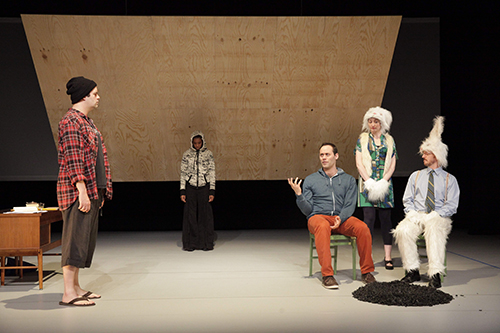
“ZERO COST HOUSE” ©Hideto Maezawa
Okada : The text for ``Super Premium~'' is written as if the text for ``Children and Floors'' had never happened (lol). I wrote it in everyday Japanese. In interviews, I often get asked the question, ``Chelfitsch uses a lot of subtle nuances of the Japanese language, but isn't it difficult to convey that with translated subtitles?'' I believe that no matter how good the translator is, the nuances of the Japanese language cannot be completely conveyed. Therefore, there are two things to keep in mind when writing text. One is to value the nuances of Japanese. I will never throw it away. So the other thing is to write texts that don't lose their power when stripped of nuance.
<Chikara Fujiwara Short Review>
chelfitsch "Super Premium Soft W Vanilla Rich" Mannheim performance @ May 2014
The setting is a convenience store that could be found anywhere. As Bach's Well-Tempered Clavier Volume 1, all 48 songs (preludes and fugues), played in a rather thin electronic arrangement, the store staff and customers performed strange movements (dance?). go. It looked like a specimen of an insect that had come from Japan, an island in the Far East. Their appearance is a caricature of modern Japanese people.
As Toshiki Okada said, ``I wanted to create something that was frivolous,'' and visually it is probably the most frivolous of all of chelfitsch's past works. ...But the explosion of irony creates a situation that is funny but not funny. The motif of Japan in ruins, which was depicted in his recent works ``Current Location'' and ``Ground and Floor,'' continues here as well. chelfitsch is seriously trying to reboot "Japanese".
to have a base, to float
Tada : Among Japanese theater writers of this generation who are around 40 (lol), Mr. Okada is by far the most active outside of Japan. When that happens, you become a foreigner wherever you go, and I wonder how you will deal with that floating feeling, or rather, the Marebito feeling... Even when I look at the flow of the work, I feel that Mr. Okada's activities as a theater writer are closely linked to the content of the work. What do you think about that floating feeling?
Okada : To me, that question seems to have hit on something very fundamental... I sometimes think that it's essentially important for theater to have a specific base of activity. If it's Tada-san, Kirari☆Fujimi would be the same. But today's chelfitsch doesn't have that kind of thing. So, I get worried and wonder if this is the right thing to do. However, I am certain that this condition suits my personality. If you stay in Japan for a long time, you'll want to open the windows in your room for ventilation, and you'll want to go abroad. I have completely become like that. For example, we sometimes meet Japanese people on-site who help us operate the subtitles. Among these people, there are quite a lot of people who say, ``I found it difficult to live in Japanese society, so that's why I came overseas.'' And I basically understand how those people feel. I've felt uncomfortable since I was young. However, I didn't have the courage to go outside, so I stayed in the country. But now, this is how I live my life. I believe that there are things that can only be done by people like me, who lacked the courage and were confined to our own country, but instead took the opportunity to become active overseas. I personally think that this awareness is very much reflected in my work.
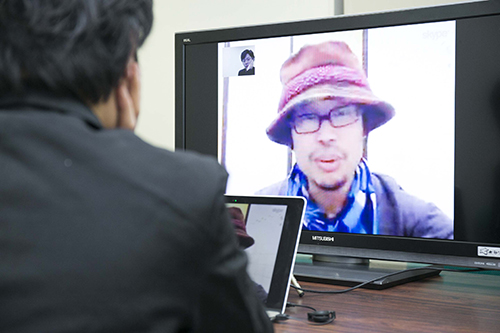
──In that sense, Kirari☆Fujimi is Tada-san's base, but on the other hand, he travels around Japan a lot, right?
Tada : At first, I didn't like Tokyo, so I stopped performing there...but now I'm also doing it in Kanto. When it comes to overseas, Seoul is the main place. I feel that that kind of appearance, or should I say malebito feel, suits my personality quite well. In the case of Fujimi, it feels like another circuit is at work.
There are several reasons why I hate Tokyo, and I wish I could live my life without having to deal with it, but sometimes when I perform in the Kanto region, I feel like, oh, I still can't escape from this distance. Or rather, it feels like someone's hand is reaching for it. Particularly now that the performance is in progress (recorded after the performance of Kirari Fujimi Repertoire's ``Nukuokun' '), there are parts of it that feel that way. That's why I can say that I don't have the guts to set up a base somewhere right now. I think it means creating connections from a certain place and expanding your reach.
──I think "movement" is a big theme for artists, and I feel that the two of you have particularly been leading the way in this direction over the past few years. His influence on young Japanese theater artists must have been quite large.For example, when I interviewed Mikie Tanaka of Hanchuu Yusei, I was surprised to hear that she said, ``I want to perform somewhere other than Tokyo.'' Then, you participated in Tokyo Deathlock's ``Ceremony'' and went on tour. I think that kind of influence is spreading.
Tada : Since chelfitsch has started going to Europe, I think it has become easier for Japanese companies to go overseas, but how do you feel about that?
Okada : I don't really have the feeling that creators and actors who are younger than me feel that way, or that they're looking for that kind of thing. Maybe that's because I don't spend much time in Japan, so I don't have many opportunities to interact with people like that.
I like touring around overseas with performances, it's fun, and above all, it allows me to perform more shows, which gives me a lot of motivation. But not all of the tour members of chelfitsch are like that. Being away from Japan can be stressful for many people, being overseas means giving up job opportunities in Japan, and it's difficult for domestic customers to understand without subtitles. I think it's natural for actors to find it more rewarding to work in front of others. I wonder if the path of working abroad is not that sought after. To be honest, I would feel lonely if that were the case (lol).
But I can't keep feeling lonely, and I think that changes in mentality may happen very slowly. I think it would be a blessing if the current generation of people in their 20s, and even younger generations, started thinking about using the roads that we have made easier to navigate.
About provocations for change
──Another thing that you both have in common is that I think your works are quite provocative. I think there is always some kind of provocation against things like ``theatre,'' ``audience seats,'' ``Japanese,'' and ``Tokyo.''
Okada : As I said earlier, I've always felt a sense of incompatibility or discomfort, and I think that has a lot to do with it. If you feel uncomfortable, you can just leave, but I don't have the courage to go abroad, so I still need to get rid of the discomfort, because if I don't, at worst I'll die. I felt the need to express my discomfort. An artist is someone who can turn expressions of discomfort into something of value, and in that sense, being an artist is a very convenient way of life for me.
──Mr. Okada is also a judge for the Kunio Kishida Drama Award, and I think that the selection reviews are a kind of provocation every year. Mr. Tada also became the youngest artistic director of a public hall in history, and is a member of the Korean Drama Awards. I also won a big award. In other words, we are in a position where we cannot run or hide, and while there are young people who will follow us and are watching over us, let's take some kind of action to change the current environment of Japanese art and society. Do you ever feel that way?
To me, the current environment in Japan feels like a swamp. I think there are quite a few theater writers who have used the feeling of confinement in Japan in the 2000s as a source of creativity, such as the swamps, and both of you have started from there and forged frontiers in your own way. I think it has opened up. But isn't this environment itself still in a "swamp" that absorbs and nullifies responses? ...If you have any thoughts on contemporary Japanese theater or society, I would like to hear from you.
Tada : ..."Swamp" (lol). I have a fairly ``hard'' image, and it's difficult to change that hardness, but there are soft parts within Japan, so I guess I'm looking for them. It's better to interact by pushing and pulling soft objects than pounding hard objects. As for public halls, there was a brief moment of excitement due to the Theater Act, but I sometimes find myself thinking, ``It's still as stiff as ever!'' In that sense, the private sector is currently more flexible. The upcoming ``Karumegi'' will be held at KAAT and the Kitakyushu Arts Theater, so I can't help but say that the public halls are stiff (lol).

──For example, what do you mean by private sector?
Tada : For example, the former Edamitsu Iron Theater and Takozo in Kochi. When it comes to opening up a place to the community, private individuals are more agile and can directly deal with the local greengrocer. Personally, it would be nice if there were small private theaters that could be consolidated into public theaters, but I don't think that will happen if we just wait like this. I became the artistic director of Kirari Fujimi in 2010, and several years have passed since the Theater Law was enacted, but I don't think anything has changed. I don't think things will change unless there are more examples of small-budget theaters like Kirari Fujimi. Anyway, the image is to find a place that is flexible. And share it with flexible people.
──What do you think of Mr. Okada?
Okada : Does it feel like the "swamp" has dried up and solidified into a very uneven shape that makes it difficult to walk? I just tried to combine what the two of you are saying now (lol). Mr. Tada, you won the Toa Drama Award. The same goes for the Kishida Drama Award, but awards don't really matter. But it doesn't matter, I want people to talk about winning the award. I want it to be something that will make a difference. A Japanese director won a Korean drama award. I think it would be a good idea to talk about this in the Japanese theater world. But it wasn't talked about much. The reason it's not talked about is because I don't have any particular interest in it. So, not being interested means that you're in a swamp-like situation, right? That's unfortunate.
I am also currently on the selection committee for the Kishida Drama Award. It's a big role, so I feel like I have to fulfill it properly, and to do that, I have to say what I want to say, so I write some provocative things in my selection reviews, but that doesn't get talked about much either. , Is that me spinning around? Something like that (laughs). The other day, I was asked to write something on the theme of ``Overseas,'' and I wrote a rather provocative article in a magazine called ``Tragic Comedy'' (November 2014 issue), but the reaction was similarly weak. (*Currently available for viewing on Toshiki Okada's Facebook page ). But, there's no point in complaining like I am now, so there's no need to give up, and there's no other option than to keep going, so I'll keep trying to provoke you (lol).
Where and with whom will you create theater?
──Thank you for your positive comments (lol). But in that sense, the fact that ``Karmegi'' and ``Super Premium~'' will be performed this time means that KAAT is becoming a more open theater, and I'm sure that these works will be provocative towards Japan today. I want to believe that it will bring me great stimulation. Lastly, could you tell us the highlights of each work?
Tada : Highlights... Of course it's the work itself, but in the case of ``Karmegi,'' I hope that the fact that it's possible to create a work like this will be stimulating. Also, the same goes for Japan and South Korea, but I also want people to see the relationship between rulers and ruled, the country, the war...
Okada : Well, ``Super Premium~'' is true... I want to create a weird atmosphere like the ``Ground and Floor'' that I created last year (lol). Did you feel bad in Germany?
──What? I don't dislike it (lol), but it did give me a stinging, unbearable feeling. Mr. Okada said, ``I want to make something funny,'' and it was actually quite funny and funny, but at the same time, I felt frozen, like, ``No, this isn't funny.''
Okada : You'll understand the content if you watch it, so what I want to emphasize here is that I want you to watch the actors. Come and watch the actors play.
Tada : Ah, that's right. I would like to see Koreans play ``Kalmegi'' as well. ...Mr. Okada, as a director, do you still want to keep working with actors who speak Japanese, or do you think it's okay to not be particular about that anymore? Which one?
Okada : I want to focus on Japanese. Japanese is my native language, I love Japanese, and there are still many Japanese actors I'd like to work with.
Tada : That's right, in my case, I don't write my own plays, so it's becoming quite common for me to create works only in Korean, and we're blessed with good actors both in Japan and Korea. I would also like to live in Korea. Well, basically, my stance is to live where there is work.
──Mr. Okada also doesn't know where he will be based at the end of his floating life. For some reason, the hat started to look like Snufkin (lol).
Okada : After being on tour for two months, my hair grew as fast as it could. I'm in trouble without a hat. Ah, isn't that why Snufkin wears a hat too?
──I see (lol). Now that we have time, I would like to end the line at this point. I look forward to each performance.

